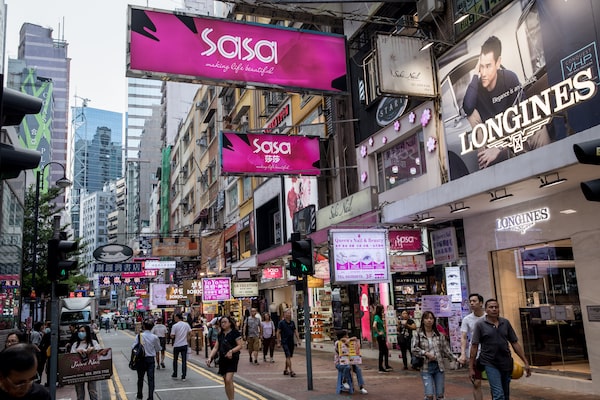
People walk past retail outlets in the Causeway Bay shopping area on Sept. 27, 2019 in Hong Kong.Chris McGrath/Getty Images
Hong Kong’s August retail sales were the worst on record, the government said on Wednesday, as escalating anti-government protests that have gripped the Chinese-ruled city for nearly four months scared off tourists and battered spending.
Retail sales in August fell 23 per cent from a year earlier, government data showed, worse than a 21.48 per cent fall in September 1998, according to Refinitiv data, as violent clashes spread across shopping districts and took a heavy toll on malls.
Cat-and-mouse clashes on Tuesday spread from the shopping district of Causeway Bay to the Admiralty area and then on to the New Territories, with police firing tear gas and water cannon at petrol bomb-throwing activists.
Protesters were out again on Wednesday but there were no reports of serious trouble.
Market analysts say the outlook is overshadowed by the protests and a weak Chinese yuan that translates into lower spending.
Retail sales fell to HK$29.4 billion ($3.75 billion) in August, a seventh consecutive month of decline. July’s drop was a revised 11.5 per cent. In volume terms, retail sales in August fell 25.3 per cent, compared with a revised 13.1 per cent drop in July.
For the first eight months of 2019, retail sales fell 6 per cent in value from a year earlier and 6.9 per cent in volume terms.
“Retail sales will likely remain in the doldrums in the near term, as the worsened economic outlook and local protests involving violence continue to weigh on consumer sentiment and inbound tourism,” a government spokesman said.
The government will monitor the implications for the labour market and the economy, he added.
Hong Kong is facing its first recession in a decade, with the government recently cutting its full-year 2019 growth forecast to 0-1 per cent, down from 2-3 per cent previously.
TOURISM HIT
Hong Kong’s finance minister had said earlier that anti-government protests were taking a heavy toll on the city’s tourism and retail sectors, while hotels in some locations were only half-full with room rates plunging 40-70 per cent.
August tourist arrivals fell 39.1 per cent on year to 3.59 million, according to the Hong Kong Tourism Board, the biggest decline since May 2003 when an outbreak of severe acute respiratory syndrome (SARS) hit. They were down 30.9 per cent from July.
The number of mainland visitors fell 42.3 per cent in August, accounting for 77.5 per cent of the total.
Many businesses have felt the pain, especially some of the city’s large luxury retailers who rely heavily on mainland Chinese spending, as the protests show no sign of easing.
Sales of jewellery, watches, clocks and valuable gifts plunged 47.4 per cent on-year in August, data showed, after a revised 24.3 per cent drop in July.
Medicines and cosmetics fell 30 per cent in August, compared with revised 16.5 per cent fall in July. Department store sales dropped 29.9 per cent in August, against a 10.4 per cent fall in July.
Hong Kong-based skin care and cosmetics chain operator Sa Sa International posted 32 per cent year on year drop in its sales in Hong Kong and Macau in August and expected its performance in September to remain “very weak”.
“Uncertainties related to the social unrest in Hong Kong since June 2019 and the trade dispute is leaving no room for optimism on economic growth in 2019,” Bess Tsin, chairman of casual wear group Bossini, said in an earnings statement.
The Hong Kong Retail Management Association had earlier urged landlords to halve rents for six months and expected some retailers may have to sack staff or even shut down.
Your time is valuable. Have the Top Business Headlines newsletter conveniently delivered to your inbox in the morning or evening. Sign up today.